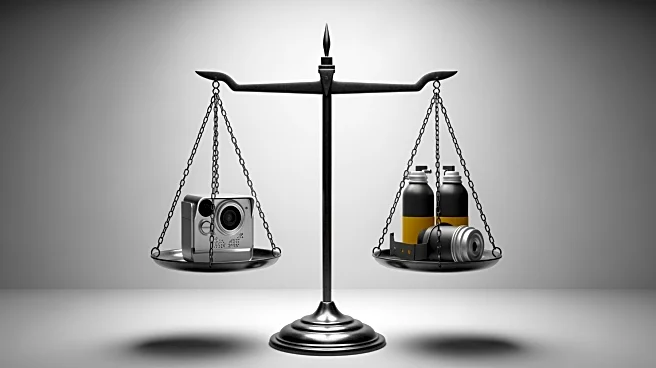What's Happening?
A federal judge in Chicago, U.S. District Judge Sarah Ellis, has expressed profound concern over the actions of Immigration and Customs Enforcement (ICE) agents, particularly regarding the use of tear
gas on media and protesters. Judge Ellis has ordered ICE Field Director Russell Hott to appear in court to address these concerns and has modified a temporary restraining order to require agents to activate body-worn cameras during public encounters. The judge's decision follows alleged violations by immigration officers during recent clashes, including an incident on Chicago's East Side where tear gas was used after a controversial maneuver to stop a fleeing vehicle. The Department of Homeland Security claims protesters were throwing rocks at officers. The restraining order prohibits agents from using tear gas and other projectiles against peaceful protesters, clergy, or journalists unless there is an immediate threat of physical harm, and only after issuing warnings.
Why It's Important?
This development is significant as it highlights ongoing tensions between federal law enforcement agencies and civil rights groups. The judge's actions underscore the importance of constitutional rights, particularly the First Amendment, which guarantees the right to protest and free speech. The case has broader implications for how federal agents conduct operations and interact with the public, especially in protest situations. The ruling could influence future policies and practices regarding law enforcement's use of force and accountability measures, such as body-worn cameras, which are intended to increase transparency and protect civil liberties.
What's Next?
The court appearance of ICE Field Director Russell Hott is expected to provide further insights into how ICE plans to comply with the judge's orders. The hearing may lead to additional legal actions or adjustments in ICE's operational protocols. The plaintiffs, including media organizations and civil rights groups, are seeking expedited discovery ahead of a hearing on a full injunction, which could result in more stringent restrictions on federal agents' actions during protests. The Department of Justice has objected to the restraining order, indicating potential legal challenges ahead.
Beyond the Headlines
The case raises ethical and legal questions about the balance between national security and civil liberties. It also highlights the role of the judiciary in safeguarding constitutional rights against potential overreach by federal agencies. The use of body-worn cameras is a critical aspect of modern law enforcement, aimed at ensuring accountability and transparency, which could set a precedent for other federal and local agencies.










